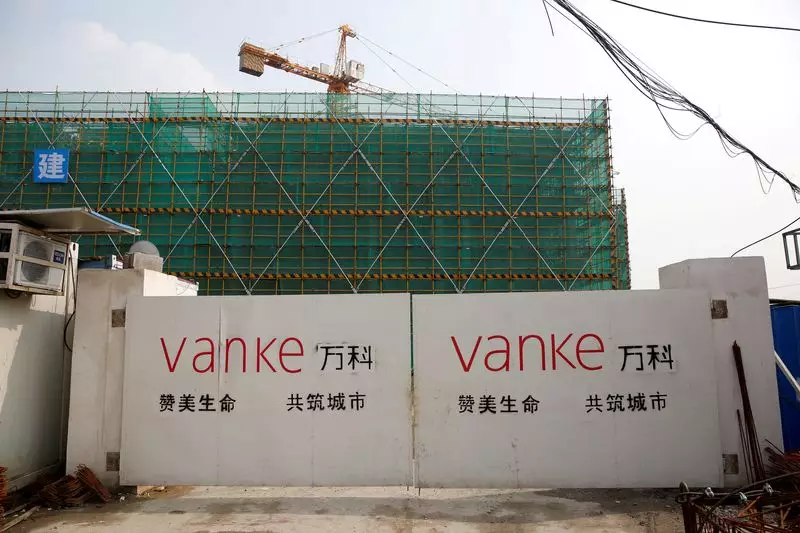China’s property market, pivotal to its economic growth, has been navigating a turbulent landscape for the better part of five years. The situation has recently escalated with the urgent need for intervention regarding one of its most recognized entities, China Vanke. As a bellwether for the industry, Vanke’s financial health has become a significant concern for authorities and market stakeholders alike. Despite previous measures aimed at alleviating the liquidity crisis, the specter of insolvency looms larger than ever over this state-backed developer.
The crisis took a dramatic turn when rumors of Vanke’s CEO being detained surfaced through state-run media. These claims, though quickly retracted, indicated a deeper malaise within the company and prompted immediate fears regarding its stability. With rising speculation around possible corporate reorganization or takeover, Vanke’s standing as a stalwart of the real estate market is increasingly questioned. The direct implications of these developments not only reflect on Vanke but also resonate throughout the wider property market, which has seen other giants falter, notably China Evergrande.
As assessments from global rating agencies have downgraded Vanke to junk status, the company’s declining financial flexibility raises alarm bells. The situation has worsened with looming repayment deadlines. With $3.4 billion due this year and a critical yuan repayment completion required by January 27, the urgency to stabilize Vanke increases. Stakeholders fear that a default could trigger broader ramifications, shaking the confidence of homebuyers who have recently begun to stabilize, and potentially crippling bank financing across the sector.
One cannot overlook the extensive debt burden that Vanke shoulders, amounting to approximately 331.3 billion yuan, a staggering $45.21 billion. As the company scrambles to alleviate this burden, it has sought to sell stakes in various business units, including logistics and property management services. However, these asset disposals have not yielded the requisite financial relief, leaving Vanke precariously teetering on the edge of financial collapse.
Given the critical importance of Vanke in maintaining the stability of China’s real estate market, local government intervention appears likely. The Shenzhen authorities have begun to coordinate with state-owned enterprises in an effort to mitigate the impending financial risks associated with Vanke’s current predicaments. This coordinated approach could signify a strategic attempt to prevent a major industry player from spiraling into bankruptcy, which would further destabilize an already beleaguered sector.
The Shenzhen government’s potential intervention could mirror actions taken with Evergrande, where a risk management committee was established in response to the developer’s insolvency announcement. Analysts speculate that a state-led rescue operation might not involve direct infusions of capital; rather, it could comprise state firms acquiring assets or facilitating access to new funding avenues in order to ensure Vanke’s survival.
If a full takeover of Vanke by the state becomes a reality, it could mark a pivotal moment in China’s economic management of the real estate sector—representing a departure from previously held stances against publicly funded bailouts. The notion that such a move could avert a severe crisis is supported by many analysts, who emphasize that Vanke’s failure would negate years of stabilization efforts by the central government.
A failure of this magnitude could reverberate beyond just the property sector, possibly impinging on the financial system as a whole. If Vanke defaults, it would signify a breakdown of confidence among homebuyers and potential investors alike, propagating panic throughout the industry. With Vanke having previously been viewed as resilient against the backdrop of market upheaval, its current plight adds a sense of urgency to calls for a decisive government response.
Ultimately, any government support might hinge on the necessity to restore homebuyer confidence. There is a consensus that as Beijing intensifies measures to bolster market sentiment, managing Vanke’s crisis effectively will be pivotal. A tangible commitment to support this once-celebrated developer could revitalize the company’s standing, reassuring potential homebuyers and investors of a more stable economic outlook.
The situation provides a clear illustration of the precarious interdependencies within China’s real estate market and underscores the broader implications of government actions. As Vanke stands at this critical juncture, the decision-makers have the daunting task of orchestrating a response that not only ensures Vanke’s survival but also reinforces the confidence needed to revive the faltering property sector in its entirety. The choices made today will likely resonate through the industry for years to come, shaping both the future of China Vanke and the stability of its property market.

